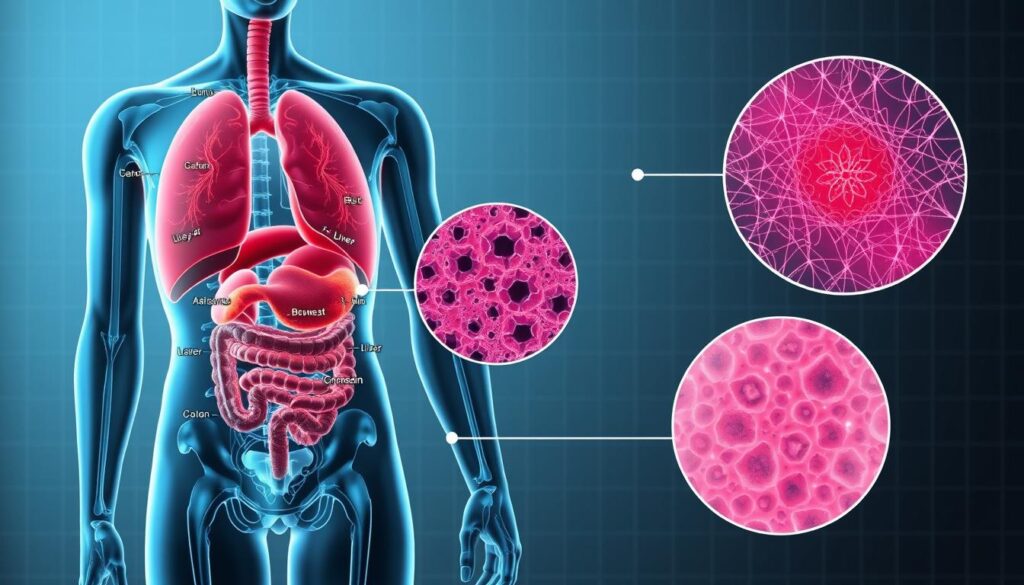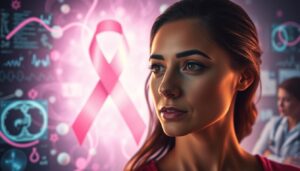Starting your health journey is often just one step away. For many, that step is towards preventing cancer. Fighting cancer means being strong, proactive, and well-informed. By starting a wellness journey, you can build traits that help you survive and stay healthy.
This guide is here to help you in your fight against cancer. It offers expert tips that could help you win. It’s all about improving your health for a better future.
For more tips on eating right to heal and prevent cancer, check out this resource from the Cancer Institute of New Jersey. It talks about the importance of a healthy weight and eating plants. These can help keep your body strong against cancer.
Key Takeaways
- Embrace cancer prevention as a cornerstone of your wellness journey.
- Recognize the power of a healthy diet and exercise in the fight against cancer.
- Stay informed through credible resources and utilize them to better navigate survivorship.
- Maintain regular screenings and adopt lifestyle changes to enhance health improvement.
- Benefit from a holistic approach that balances physical, emotional, and social support.
Understanding the Basics of Cancer

In our quest to boost cancer awareness and better health, knowing the basics of cancer is key. Learning about cancer definition, common cancer types, and oncology basics helps people fight for their health. This knowledge leads to early diagnosis.
What is Cancer?
Cancer is when abnormal cells grow out of control in the body. These cells can spread to other areas, a process called metastasis. Understanding oncology basics is important for knowing risks and symptoms.
Common Types of Cancer
Many cancer types affect different parts of the body. Common ones include breast, lung, prostate, and colorectal cancer. Knowing these helps spread cancer awareness.
The Importance of Early Detection
Finding cancer early is key to managing it well. Early detection can lead to better treatment options and higher survival rates. Regular check-ups and knowing symptoms are vital for early diagnosis.
| Cancer Type | 5-Year Survival Rate (Early Stage) | 5-Year Survival Rate (Late Stage) |
|---|---|---|
| Breast Cancer | 99% | 27% |
| Lung Cancer | 56% | 5% |
| Prostate Cancer | 98% | 30% |
| Colorectal Cancer | 90% | 14% |
These numbers show why early detection is so important. By learning more about oncology basics, we can prevent and detect cancer sooner. This leads to better survival rates and quality of life for many. With this knowledge, we can all work towards early detection and treatment.
Preventative Measures to Lower Cancer Risk
Living a healthy lifestyle is key in fighting cancer. By making smart choices in nutrition, staying active with exercise, and avoiding harmful substances, you can lower your cancer risk.
Healthy Diet and Nutrition
Eating lots of fruits, veggies, and whole grains can help a lot. Cutting down on processed and red meats is also important. Foods like broccoli, berries, and legumes are full of nutrients that help fight cancer.
Regular Exercise and its Benefits
Exercise is great for your heart and muscles, and it also helps prevent cancer. Aim for 150 minutes of moderate or 75 minutes of high-intensity exercise each week. This helps keep you healthy and reduces cancer risk.
Limiting Exposure to Carcinogens
Staying away from harmful substances like tobacco smoke and asbestos is vital. Being smart about what chemicals you’re exposed to can lower your cancer risk. Using sunscreen is also important to protect against skin cancer.
- Eating a balanced diet rich in nutrition
- Maintaining regular exercise routines
- Avoiding exposure to environmental carcinogens
By following these steps, you can live a healthy lifestyle that fights cancer and boosts your overall health. These changes can make your life more enjoyable and fulfilling. They show that preventing disease can be a natural part of everyday life.
Diagnostic Tests and When to Get Screened
Getting cancer screenings and tests early is key to fighting cancer. Early detection and regular health checks can greatly improve treatment chances. It’s also important to tailor screenings based on your genetic risk.
Knowing when to get tested and how often can save lives. Your age, family history, and genes guide when to start screenings. This section explains how to follow these guidelines and why genetics matter.
- Screening Recommendations for Common Cancers
Guidelines say men and women should start cancer tests at certain ages. For example, colon cancer tests should start at 45 for most, but earlier if there’s a family history. Breast cancer tests begin at 40, but sooner if you have certain genes.
- The Role of Genetics in Cancer Screening
Genetic tests can show your risk for different cancers. Doctors might suggest more tests or earlier checks if you have certain genes. This is very important for cancers like breast, ovarian, and colon, where catching it early can help a lot.
By making screening plans based on your risk, you can take a more active role in your health. Knowing your risk and getting regular health checks can help prevent and treat cancer better. This approach can save lives and improve health outcomes.
Treatment Options for Cancer
In the world of oncology, new ways to fight cancer are being found. These include surgery, radiation, chemotherapy, and new methods like immunotherapy and personalized medicine. These advancements bring hope and better results for those fighting cancer.
Surgery and Radiation
Surgery is key in removing tumors. It’s often paired with radiation therapy to make treatment more effective. Radiation uses high-energy rays to kill cancer cells, while trying not to harm healthy cells nearby.
Chemotherapy is a mainstay in cancer treatment, using drugs to kill cancer cells. Targeted therapies have changed chemotherapy. They focus on specific cancer-related molecules, reducing side effects and improving results.
Immunotherapy and Emerging Treatments
Immunotherapy is a big step forward, using the body’s immune system to fight cancer. It’s part of a move towards personalized medicine. Treatments are now made to fit the genetic makeup of both the patient and their tumor, making them more effective and safer.
| Treatment Type | Primary Benefit | Common Usage |
|---|---|---|
| Surgical Oncology | Physically removes the tumor | Solid tumors like breast and colon cancer |
| Radiation Therapy | Targets and kills cancer cells | Localized cancer treatment |
| Chemotherapy | Attacks rapidly growing cancer cells | Widespread or metastatic cancer |
| Immunotherapy | Boosts immune system response | Advanced or hard-to-treat cancers |
| Personalized Medicine | Tailored treatment plans | Genetically unique cancers |
The use of different treatments shows how complex and changing cancer care is. It aims to offer the best results and ease the challenges of cancer treatment.
Lifestyle Changes During and After Treatment
Going through cancer treatment changes your life a lot. You need to make big lifestyle modifications that last long after treatment. It’s not just about beating the disease. It’s also about improving your life through nutrition therapy, cancer recovery exercise, and psychological support.
These steps help you get back to normal and stay healthy for a long time. They are key to good survivorship care.
Nutrition is very important during and after cancer treatment. Good nutrition helps your body heal and boosts your immune system. Exercise is also key, helping you regain strength, fight fatigue, and feel better overall.
But cancer also affects your mind and feelings. Getting help from counselors and therapists can really help. It can make you feel less anxious and depressed, helping you cope with stress and stay strong.
| Aspect of Care | Benefits | Suggested Actions |
|---|---|---|
| Nutrition Therapy | Boosts immune function, aids in tissue healing | Personalized diet plans, supplementation |
| Cancer Recovery Exercise | Increases strength, reduces treatment side effects | Guided exercises, tailored physical activity programs |
| Psychological Support | Enhances mental health, reduces stress | Counseling sessions, stress management techniques |
Changing your life to fight cancer is hard. You and your family need a lot of help and support. Research, like the one here, shows the need for care that fits each person’s needs. Family and caregivers play a big role in helping with daily tasks and emotional support.
For many, it’s not just about living through cancer. It’s about living well after it. Combining nutrition, exercise, and mental health support is key to a strong recovery.
Support Systems and Resources for Cancer Patients
Cancer affects not just the body but also the mind and emotions of patients and their families. Support systems, like cancer support networks, counseling, and advocacy, are key. They help patients during and after treatment. Each resource offers unique help, fitting the needs of cancer patients.
Family and Community Support
Family and friends are the first to offer support, both emotional and practical. Community support, including advocacy and local networks, is also vital. These groups help with education, transportation, and emotional support, making treatment less lonely.
Professional Counseling and Support Groups
Professional counseling is essential for coping with cancer. Therapists help patients and families deal with the disease’s mental effects. Support groups let people share their experiences and find comfort with others who understand.
Online Resources and Helplines
Today, online communities and helplines offer quick support and info. They connect people worldwide, share stories, and offer emotional support. Helplines provide immediate help and advice on coping and patient rights.
| Resource Type | Description | Benefits |
|---|---|---|
| Cancer Support Networks | Organizations providing emotional,financial, and educational support | Reduces isolation, offers personalized help |
| Counseling Services | Professional mental health support | Improves emotional well-being, aids in stress management |
| Online Communities | Platforms for sharing experiences and advice | Accessible 24/7, connects patients globally |
| Helpline Resources | Immediate assistance via phone or chat | Provides quick access to expert advice, emergency support |
Navigating the Financial Aspects of Cancer Care
Getting a cancer diagnosis is tough, both emotionally and physically. The financial stress it brings can make things even harder. It’s important to understand cancer insurance plans and financial aid to manage costs. This helps patients focus on getting better, not just paying bills.
Understanding Insurance Coverage
Insurance is key in dealing with cancer costs. Cancer insurance plans help by covering treatment and hospital stays. They might also cover some non-medical costs related to treatment. It’s important to talk to your insurance provider to know what’s covered. You might need to upgrade your plan if it’s not enough.
Seeking Financial Aid and Assistance Programs
If insurance doesn’t cover all costs, financial aid and patient assistance programs can help. These programs offer support based on your diagnosis and treatment needs. They can greatly reduce the financial stress of medical bills.
Here are some tips for using these resources:
- Check if you qualify for each financial aid and patient assistance program.
- Keep detailed records of all your healthcare expenses.
- Ask for help from social workers or financial consultants who know about cancer care.
Managing the financial side of cancer treatment can ease your economic worries. It also helps your overall health by reducing stress. Look into all options for cancer insurance, financial aid, and patient assistance programs.
Conclusion
In the fight against cancer, knowing what you’re up against is key. We’ve explored what cancer is, why early detection matters, and the latest in cancer care. By taking steps to prevent it, getting regular check-ups, and knowing your treatment options, you can face cancer head-on.
Overcoming cancer isn’t a solo journey. Having a supportive community, expert advice, and online resources is vital. This article has shown how making lifestyle changes, finding support, and accessing financial help can make a big difference.
This guide is a light in the dark, showing the way to live with cancer and even thrive. It celebrates the human spirit’s strength and the progress in medicine that make survival stories possible. With a full approach to cancer care, survivors can look forward to a future where cancer is just a chapter, not the end.




